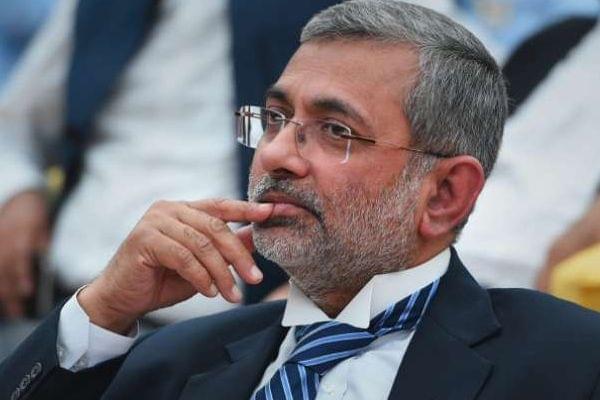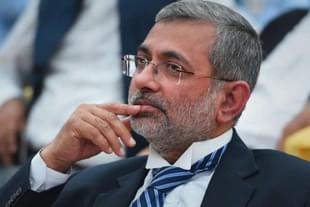Ideas
The Judge Pontificate: Controversial Judge Kurian Joseph, Who Wore His Faith On His Sleeves, Retires From SC
Swarajya Staff
Nov 30, 2018, 02:21 PM | Updated 02:21 PM IST
Save & read from anywhere!
Bookmark stories for easy access on any device or the Swarajya app.


Justice Kurian Joseph, the third senior-most judge of the Supreme Court, retired on Thursday (29 November) after a five-and-a-half year tenure at the highest court of the land.
During his tenure, Justice Joseph was most vocal in diatribes against the executive. By repeatedly raising a banner of revolt in public, Justice Joseph did not do the non-political nature of his office any good.
In April this year, he went ballistic and claimed that the “very life and existence” of the Supreme Court is under threat as the government spent three months over the Collegium’s recommendations for elevations to the apex court.
In May this year, Justice Joseph went public against the move to reject the nomination of Justice K M Joseph, Chief Justice of the Uttarakhand High Court, as Supreme Court judge and claimed that it was unprecedented. He said: “never has it happened before like this that the names sent by the Collegium are asked to be reconsidered”.
The Times of India quoted him as saying, “things that shouldn't have happened are happening. Things that haven't happened so far are also happening… The list of names sent by the collegium getting altered, cut short and later sent back has never happened before... The hope is that there would be discussions on how it happened so that it wouldn't happen again."
By speaking openly about his disagreement, Justice Joseph nearly made it impossible for the Collegium to do anything but reiterate the appointment of Judge K M Joseph, for anything else will look like the Collegium kowtowing to the executive. K M Joseph was later elevated to the Supreme Court.
By his frequent and public interjections, Justice Joseph effectively politicised the judiciary and may have done its real independence irreparable damage. By openly canvassing for a fellow judge of the same faith, he was seen as sending the wrong signal.
Justice Joseph was also noted for his penchant to hit out at his own senior colleagues through the media - he not even spared Chief Justices Dipak Misra or H L Dattu.
Along with Justices Ranjan Gogoi, J Chelameswar and Madan B Lokur, Justice Joseph, who was one of the four senior judges to have conducted an unprecedented 12 January presser staging a virtual revolt against the then Chief Justice of India, Dipak Misra.
In 2015 when the then Chief Justice Dattu had called a conference of high court chief justices on Good Friday, Justice Joseph refused to attend saying it came in the way of his faith. He even complained to the Prime Minister about it, adding a lecture on Indian secularism.
Justice Joseph also declined to attend Prime Minister Narendra Modi’s dinner for top judges on the ground that the event and the ongoing judges conference clashed with Good Friday and Easter weekend.
He wrote to the Prime Minister, “I regret my inability to attend the event as the Conference coincides with the Good Friday ceremonies. Good Friday is a day of great religious significance to us, marking the crucifixion and death of Jesus Christ.
Justice Joseph’s candid interview to Malayalam Manorama on the eve of his retirement is very instructive. On being a part of the press conference against Misra, Justice Joseph said that "...a dog bites its owner only if he is not waking up despite repeated barking.”
On his protest against holding a judicial conference on Easter and Good Friday, Justice Joseph defended himself by saying: “...yes, I consider that decision as a challenge against Secularism..”
Asked on his active association with Kerala Congress, a predominantly Christian party with strongholds in central Kerala, Justice Joseph responded rather brazenly, “..A judge who has worked in politics will have much larger understanding of societal issues than one who has not..”
Justice Joseph also took pride in being known in the legal circles more as a mediator/priest instead of lawyer or advocate (he had stopped his work in seminary midway to continue legal studies).
Joseph “humbly accepts" the joke that “going to his court bench is like going to a priest's cabin”.
Justice Joseph also claimed that he will not be accepting any post retirement appointment from the current dispensation while tacitly hinting that he is open to opportunities of a different political establishment is in place “...in the current climate, Govt considers such appointments as some favors given by them. I don't want any such favor from such a Govt..”
Born on 30 November 1953 in Kerala, Justice Joseph had his early education in Ernakulam and got his law degree from Kerala Law Academy, Thiruvananthapuram.
Justice Joseph started his legal career as an advocate in Kerala High Court. He was designated as a senior advocate in 1996 and assumed office as judge of Kerala High Court in 2000. He later served as Chief Justice of Himachal Pradesh High Court before his elevation to the Supreme Court in 2013.
Justice Joseph was part of the five-judge bench that delivered a landmark judgement that ruled triple talaq as illegal. In his judgement, Justice Joseph ruled that practice is against the tenets of the Quran and hence violates Shariah. In his judgement, he disagreed that triple talaq is integral to the practice of Islam and noted that what is bad in Quran cannot be part of Shariah.
Justice Joseph was also in the constitutional bench headed by Justice J S Khehar that scrapped the National Judicial Appointments Commission Act passed by the NDA government to deal with appointments in higher judiciary.
Justice Joseph also presented a dissenting opinion on the validity of the death penalty as a part of a three-judge bench that reviewed the effectiveness of the death penalty in deterring crime. He wrote: “every death penalty case before the court deals with a human life that enjoys certain constitutional protections and if life is to be taken away, then the process must adhere to the strictest and highest constitutional standards…”





